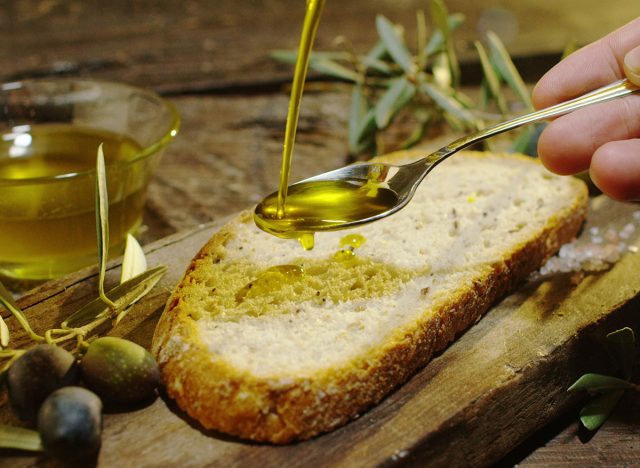Cooking with Olive Oil Decreases Risk of Deadly Diseases, Says New Study

If you love to cook with olive oil, or even drizzle it on a bed of leafy greens for a side salad, then you're in luck. According to a new study published by the Journal of American College of Cardiology, olive oil consumption has been linked to a lower risk of cause-specific mortality including cardiovascular disease, cancer, neurodegenerative disease, and respiratory disease.
The study used two cohorts of over 92,000 men and women in the United States who were free of cardiovascular disease or cancer over a 28-year period. After factoring in some of the deaths that occurred from these cohorts, the study concluded from the current participants with high olive oil consumption (at least half a tablespoons a day, or up to 7 grams) was associated with a lower all-cause mortality risk when compared to those who rarely consumed olive oil.
This study also compares the use of other fatty substitutes used in kitchens like margarine, butter, mayonnaise, and other dairy-fat equivalents, and concluded that when replacing these items with olive oil, there was a lower risk of mortality for participants.
In particular, higher olive oil intake was associated with a 19% lower risk of cardiovascular disease mortality, 17% lower risk of cancer mortality, 29% lower risk of neurodegenerative disease mortality, and 18% lower risk of respiratory disease mortality.

This may not come as much of a shock, given the numerous ways olive oil has been proven to nutritionally benefit the human body. Previous studies have shown that not only can olive oil reduce your risk of stroke and heart disease, but is also linked to decreased risk of rheumatoid arthritis, diabetes, and even causes better bone density for women.
Compared to the other fatty cooking substances high in saturated fats, olive oil is a healthy source of unsaturated fat, which can help improve blood cholesterol levels and ease inflammation.
Lastly, olive oil is a main source of fat in the Mediterranean Diet, which is continually rated the overall healthiest way to eat. This type of diet is followed by residents of the Mediterranean, which consists of the densest population of people who live to be over 100. A study in Foods was even able to prove that consumption of olive oil is linked to successful aging for individuals over 70 years of age.
With numerous research backing up the claim, it seems the recently published study regarding olive oil consumption is only further proof that this ingredient provides major benefits to one's body when regularly consumed.
For more nutrition news, read these next:
- The Surprising Drinking Habit Fit People Live By, Says New Study
- The #1 Best Supplement for Memory Loss, Says New Study
- Taking This Supplement To Prevent Depression Is A Myth, Says New Study








